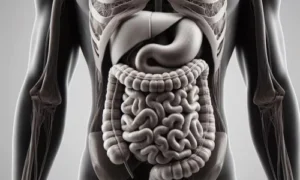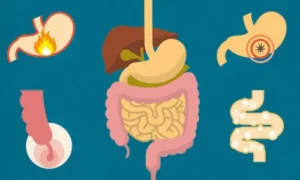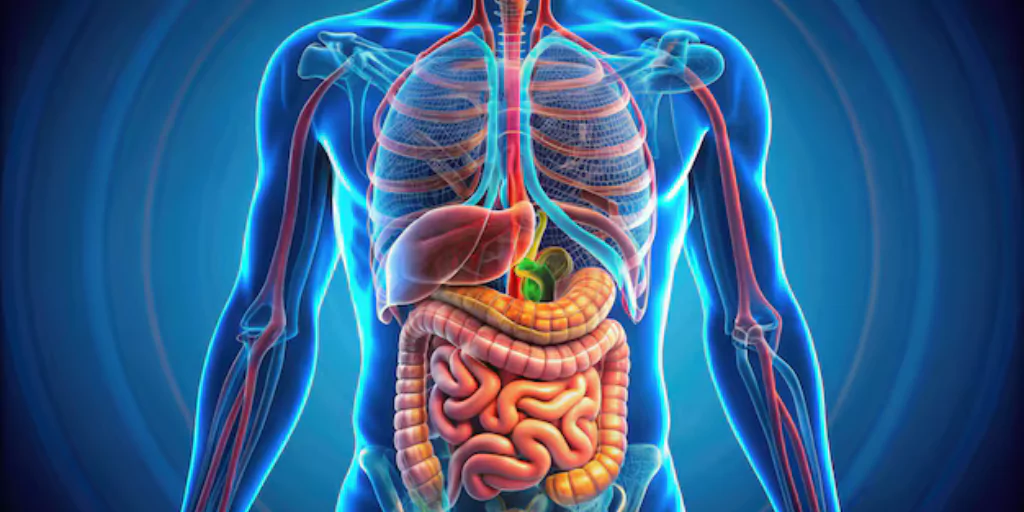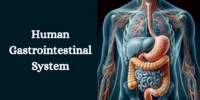Human digestion is a vital and intricate process that plays a key role in converting the food we eat into the energy and nutrients necessary for survival and overall health. The human digestive system is a complex network of organs that work in harmony through a series of synchronised actions—from the moment food enters the mouth to the point where waste is eliminated from the body.
What is Digestion?

Digestion is the biochemical and mechanical process of converting food into simpler compounds such as glucose, amino acids, and fatty acids that the body can absorb and use. It helps to maintain energy levels, promotes growth, and repairs bodily tissues.
The Digestive Process: Step-by-Step

Let’s break down the entire process into major stages:
1. Ingestion (Mouth)
Function: Chewing and mixing food with saliva.
Importance: Saliva contains enzymes, such as amylase, that begin breaking down carbohydrates. Chewing also increases the surface area of food for better digestion.
2. Propulsion (Esophagus)
Function: Moves food from the mouth to the stomach through a muscular motion called peristalsis.
Importance: Ensures smooth transportation of food without digestion happening in this stage.
3. Digestion (Stomach)
Function: Food is mixed with gastric juices, including hydrochloric acid and enzymes.
Importance: Proteins begin to break down; harmful bacteria are killed. The mixture becomes a semi-liquid called chyme.
4. Absorption (Small Intestine)
Function: Chyme passes through the small intestine, where nutrients are absorbed into the bloodstream.
Importance: The Majority of nutrient absorption occurs here with the help of enzymes from the pancreas and bile from the liver.
5. Water Absorption and Waste Formation (Large Intestine)
Function: Absorbs water and electrolytes from the remaining indigestible food matter.
Importance: Forms solid waste (faeces) and maintains fluid balance in the body.
6. Elimination (Rectum & Anus)
Function: Expels undigested and unabsorbed food from the body.
Importance: Prevents the buildup of waste and toxins.
Why is Digestion Important?
- Nutrient Supply: Ensures the body gets essential nutrients like vitamins, proteins, and minerals.
- Energy Production: Converts food into glucose, which fuels every cell in the body.
- Immunity Support: A large part of our immune system resides in the gut.
- Waste Removal: Efficient digestion helps eliminate toxins and prevents gastrointestinal issues.
- Mental Health: A healthy gut influences brain function and mood (gut-brain connection).
Common Digestive Problems

- Acidity
- Constipation
- Irritable Bowel Syndrome (IBS)
- Ulcers
- Indigestion
These issues can arise due to poor diet, stress, dehydration, or lack of exercise.
Tips for a Healthy Digestive System

- 🥗 Eat Fibre-Rich Foods – Whole grains, fruits, and vegetables.
- 💧 Stay Hydrated – Drink at least 2-3 litres of water daily.
- 🚶 Exercise Regularly – Promotes intestinal movement.
- ⏰ Follow Regular Meal Times – Avoid overeating or skipping meals.
- 🧘 Manage Stress – Chronic stress impacts digestion negatively.
- 🚭 Avoid Smoking and Limit Alcohol
Conclusion
The human digestive system is a fascinating and crucial mechanism that maintains life on all levels. Understanding the process helps us recognise the significance of maintaining digestive health. You may ensure that your digestive system works smoothly by taking proper care, eating a well-balanced diet, and making healthy lifestyle choices.






